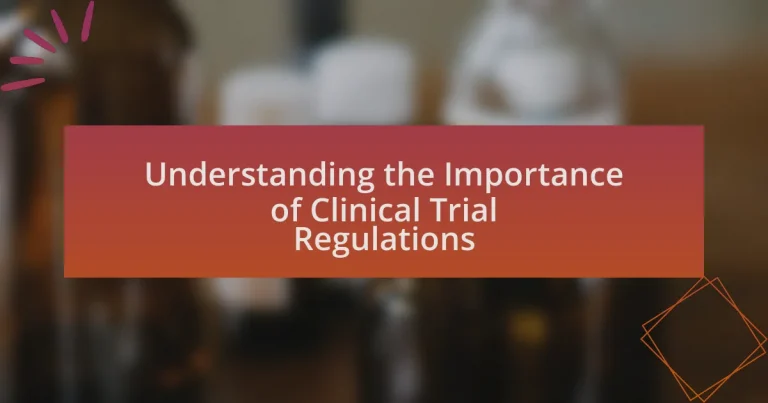Clinical trial regulations are essential legal and ethical guidelines that govern clinical research involving human participants, ensuring their safety, rights, and well-being while maintaining data integrity. This article outlines the necessity of these regulations, the risks associated with unregulated trials, and the key components that protect participants, such as informed consent and oversight by regulatory bodies like the FDA and EMA. It also discusses the impact of regulations on the research process, the stages of clinical trials, and the challenges researchers face in compliance, emphasizing the importance of ethical conduct and best practices in clinical research.
What are Clinical Trial Regulations?
Clinical trial regulations are legal and ethical guidelines that govern the conduct of clinical research involving human participants. These regulations ensure the safety, rights, and well-being of participants while maintaining the integrity of the data collected. In the United States, the Food and Drug Administration (FDA) and the Department of Health and Human Services (HHS) set forth regulations, such as the Code of Federal Regulations Title 21, which outlines requirements for informed consent, Institutional Review Board (IRB) oversight, and Good Clinical Practice (GCP) standards. These regulations are crucial for maintaining public trust in clinical research and ensuring that new medical treatments are both effective and safe before they are approved for widespread use.
Why are Clinical Trial Regulations necessary?
Clinical trial regulations are necessary to ensure the safety, efficacy, and ethical conduct of clinical research involving human participants. These regulations provide a framework that protects participants from potential harm, ensures informed consent, and maintains the integrity of the data collected. For instance, the Declaration of Helsinki outlines ethical principles for medical research involving human subjects, emphasizing the importance of participant welfare and informed consent. Additionally, regulatory bodies like the FDA and EMA establish guidelines that require rigorous review processes, ensuring that trials are scientifically sound and ethically conducted. This regulatory oversight is crucial for maintaining public trust in medical research and ensuring that new treatments are both safe and effective before they reach the market.
What risks do unregulated clinical trials pose?
Unregulated clinical trials pose significant risks, including patient safety concerns, lack of efficacy data, and potential for exploitation. Without oversight, participants may be exposed to harmful treatments without informed consent, leading to adverse health outcomes. Additionally, the absence of regulatory standards can result in unreliable data, making it difficult to assess the true effectiveness of a treatment. Historical instances, such as the Tuskegee Syphilis Study, highlight the dangers of unregulated trials, where ethical violations led to severe consequences for participants.
How do regulations protect participants in clinical trials?
Regulations protect participants in clinical trials by establishing ethical standards and safety protocols that must be followed. These regulations, enforced by agencies such as the Food and Drug Administration (FDA) and the European Medicines Agency (EMA), require informed consent, ensuring that participants are fully aware of the risks and benefits before enrolling. Additionally, regulations mandate the oversight of trial protocols by Institutional Review Boards (IRBs), which review and monitor the study to safeguard participant welfare. For instance, the Declaration of Helsinki outlines ethical principles for medical research involving human subjects, reinforcing the necessity of participant protection.
What are the key components of Clinical Trial Regulations?
The key components of Clinical Trial Regulations include ethical considerations, informed consent, safety monitoring, data integrity, and compliance with Good Clinical Practice (GCP). Ethical considerations ensure that trials are conducted in a manner that respects the rights and welfare of participants, as outlined in the Declaration of Helsinki. Informed consent mandates that participants are fully aware of the trial’s purpose, risks, and benefits before agreeing to participate. Safety monitoring involves ongoing assessment of participant health and adverse events, often overseen by an independent Data Safety Monitoring Board (DSMB). Data integrity is crucial for ensuring that the data collected is accurate and reliable, which is enforced through rigorous documentation and auditing processes. Compliance with GCP guidelines, established by the International Council for Harmonisation (ICH), ensures that trials are conducted ethically and scientifically sound, safeguarding participant rights and ensuring the credibility of trial results.
What role do ethical guidelines play in clinical trials?
Ethical guidelines play a crucial role in clinical trials by ensuring the protection of participants’ rights, safety, and well-being. These guidelines, such as the Declaration of Helsinki and the Belmont Report, establish standards for informed consent, risk assessment, and the equitable selection of subjects. They are designed to prevent exploitation and harm, ensuring that the benefits of research outweigh the risks. For instance, adherence to these ethical principles has been shown to enhance public trust in research, which is essential for participant recruitment and the overall success of clinical trials.
How do regulatory bodies oversee clinical trials?
Regulatory bodies oversee clinical trials by establishing guidelines and regulations that ensure the safety, efficacy, and ethical conduct of the trials. These bodies, such as the U.S. Food and Drug Administration (FDA) and the European Medicines Agency (EMA), require that clinical trials adhere to Good Clinical Practice (GCP) standards, which include rigorous protocols for study design, informed consent, and data integrity.
Additionally, regulatory bodies conduct inspections and audits of trial sites to verify compliance with these standards and may require regular reporting of trial progress and adverse events. For instance, the FDA mandates that sponsors submit Investigational New Drug (IND) applications before initiating trials, which include detailed plans for the study and safety monitoring. This oversight is crucial for protecting participants and ensuring that the data generated is reliable and can support regulatory approval for new therapies.
How do Clinical Trial Regulations impact the research process?
Clinical trial regulations significantly impact the research process by establishing standards for safety, efficacy, and ethical conduct. These regulations ensure that trials are designed to protect participants, requiring informed consent and oversight by institutional review boards. For instance, the U.S. Food and Drug Administration (FDA) mandates that clinical trials adhere to Good Clinical Practice (GCP) guidelines, which include rigorous protocols for data collection and reporting. This regulatory framework not only enhances the credibility of research findings but also facilitates the approval process for new therapies, as compliance with regulations is often a prerequisite for market authorization.
What are the stages of clinical trials governed by regulations?
The stages of clinical trials governed by regulations include four main phases: Phase 1, Phase 2, Phase 3, and Phase 4. Phase 1 focuses on safety and dosage, involving a small group of healthy volunteers to assess the drug’s safety profile. Phase 2 evaluates the drug’s efficacy and side effects in a larger group of participants who have the condition the drug aims to treat. Phase 3 involves large-scale testing to confirm effectiveness, monitor side effects, and compare the drug to commonly used treatments. Finally, Phase 4 occurs post-marketing, where the drug’s long-term effects and overall impact on the population are studied. These phases are regulated by agencies such as the FDA to ensure the safety and efficacy of new treatments before they reach the market.
How do regulations influence trial design and methodology?
Regulations significantly influence trial design and methodology by establishing standards that ensure participant safety, data integrity, and ethical conduct. Regulatory bodies, such as the FDA and EMA, mandate specific protocols for trial phases, including randomization, blinding, and control groups, which shape how trials are structured. For instance, the International Conference on Harmonisation (ICH) guidelines dictate Good Clinical Practice (GCP), requiring that trials are designed to minimize risks and maximize data reliability. These regulations also necessitate comprehensive documentation and reporting, which further standardizes methodologies across different studies, ensuring that results are comparable and reproducible.
What is the significance of informed consent in clinical trials?
Informed consent is significant in clinical trials as it ensures that participants are fully aware of the risks, benefits, and procedures involved before agreeing to take part. This process respects the autonomy of individuals, allowing them to make informed decisions about their participation. According to the Declaration of Helsinki, informed consent is a fundamental ethical requirement that protects participants’ rights and welfare. Furthermore, research indicates that proper informed consent processes can enhance participant trust and engagement, ultimately contributing to the integrity and validity of the trial outcomes.
How do regulations affect the approval of new treatments?
Regulations significantly influence the approval of new treatments by establishing the standards and processes that must be followed to ensure safety and efficacy. Regulatory bodies, such as the U.S. Food and Drug Administration (FDA), require extensive clinical trials to gather data on a treatment’s effects before it can be marketed. For instance, the FDA mandates that new drugs undergo three phases of clinical trials, which assess safety, dosage, and effectiveness, ensuring that only treatments meeting rigorous scientific criteria receive approval. This structured approach helps protect public health by preventing unsafe or ineffective treatments from entering the market.
What is the process for obtaining regulatory approval?
The process for obtaining regulatory approval involves submitting a comprehensive application to the relevant regulatory authority, such as the FDA in the United States or EMA in Europe. This application typically includes data from preclinical studies, clinical trial results, manufacturing information, and proposed labeling. Regulatory authorities then review the submission to ensure that the product is safe and effective for its intended use. The review process may involve advisory committees and can take several months to years, depending on the complexity of the application and the regulatory pathway. For instance, the FDA’s review process for new drug applications can take an average of 10 months, as outlined in their guidelines.
How do regulations ensure the safety and efficacy of new drugs?
Regulations ensure the safety and efficacy of new drugs by establishing rigorous standards for clinical trials and approval processes. These regulations require that drugs undergo multiple phases of testing, including preclinical studies and several phases of human trials, to assess their safety, dosage, and effectiveness. For instance, the U.S. Food and Drug Administration (FDA) mandates that before a drug can be marketed, it must demonstrate significant evidence of safety and efficacy through controlled clinical trials, which are monitored for compliance with Good Clinical Practice (GCP) guidelines. This structured approach helps to minimize risks to participants and ensures that only drugs meeting established safety and efficacy criteria are approved for public use.
What challenges do researchers face with Clinical Trial Regulations?
Researchers face several challenges with Clinical Trial Regulations, primarily due to the complexity and variability of these regulations across different regions. The intricate nature of regulatory requirements can lead to difficulties in compliance, as researchers must navigate diverse guidelines set by entities such as the FDA in the United States and EMA in Europe. Additionally, the evolving landscape of regulations, which often changes in response to new scientific findings or public health needs, can create uncertainty and require continuous adaptation by researchers. For instance, the introduction of new data protection laws, such as GDPR in Europe, has added layers of compliance that researchers must address to protect participant information while conducting trials.
What are common compliance issues in clinical trials?
Common compliance issues in clinical trials include inadequate informed consent, failure to adhere to the study protocol, and improper data management. Informed consent is critical, as it ensures participants understand the risks and benefits of the trial; violations can lead to ethical concerns and regulatory penalties. Adhering to the study protocol is essential for maintaining the integrity of the trial results; deviations can compromise data validity and lead to regulatory scrutiny. Additionally, improper data management, including inaccurate record-keeping and failure to report adverse events, can result in significant compliance violations, impacting the trial’s credibility and regulatory approval.
How can researchers navigate complex regulatory requirements?
Researchers can navigate complex regulatory requirements by thoroughly understanding the specific regulations applicable to their field and maintaining clear communication with regulatory bodies. Familiarity with guidelines from organizations such as the FDA or EMA is essential, as these provide frameworks for compliance. Additionally, engaging with regulatory consultants or legal experts can offer insights into navigating the intricacies of these requirements. Regular training and updates on regulatory changes also help researchers stay informed, ensuring adherence to evolving standards.
What are the consequences of non-compliance with regulations?
Non-compliance with regulations can lead to severe legal and financial consequences for organizations involved in clinical trials. Regulatory bodies, such as the FDA, may impose fines, suspend or revoke licenses, and halt ongoing trials, which can result in significant financial losses and damage to reputation. For instance, in 2018, the FDA issued a warning letter to a clinical trial sponsor for failing to adhere to Good Clinical Practice, highlighting the potential for regulatory action and the impact on future research opportunities.
How can researchers stay updated on Clinical Trial Regulations?
Researchers can stay updated on Clinical Trial Regulations by regularly consulting official regulatory agency websites, such as the U.S. Food and Drug Administration (FDA) and the European Medicines Agency (EMA). These agencies provide the latest guidelines, updates, and changes in regulations that impact clinical trials. Additionally, subscribing to industry newsletters, attending relevant conferences, and participating in professional organizations can further enhance awareness of regulatory developments. For instance, the FDA frequently publishes updates and guidance documents that are crucial for compliance and best practices in clinical research.
What resources are available for understanding regulatory changes?
Resources available for understanding regulatory changes include government websites, industry publications, and professional organizations. Government websites, such as the U.S. Food and Drug Administration (FDA) and the European Medicines Agency (EMA), provide official guidelines and updates on regulatory frameworks. Industry publications, like the Journal of Clinical Research Best Practices, offer insights and analyses on recent changes and their implications. Professional organizations, such as the Association of Clinical Research Professionals (ACRP), provide training, webinars, and resources to help professionals stay informed about regulatory developments. These resources collectively ensure that stakeholders in clinical trials are equipped with the necessary information to navigate regulatory changes effectively.
How can professional organizations assist researchers in compliance?
Professional organizations assist researchers in compliance by providing resources, guidance, and training on regulatory requirements. These organizations often develop best practice guidelines that align with local and international regulations, ensuring researchers understand their obligations. For example, the American Medical Association offers educational programs that cover compliance with the Health Insurance Portability and Accountability Act (HIPAA) and the Common Rule, which are critical for clinical trials. Additionally, professional organizations may advocate for policy changes that support compliance and provide platforms for networking, allowing researchers to share experiences and solutions related to regulatory challenges.
What best practices should researchers follow regarding Clinical Trial Regulations?
Researchers should adhere to best practices such as ensuring compliance with regulatory requirements, obtaining informed consent, and maintaining data integrity in clinical trials. Compliance with regulations, such as those set by the FDA and EMA, is essential to ensure participant safety and the validity of trial results. Obtaining informed consent from participants is a legal and ethical obligation that ensures they understand the risks and benefits of participation. Maintaining data integrity involves accurate record-keeping and reporting, which is crucial for the credibility of the research findings. These practices are supported by guidelines from organizations like the International Council for Harmonisation (ICH) and the Declaration of Helsinki, which emphasize the importance of ethical conduct and regulatory compliance in clinical research.
How can researchers ensure ethical conduct in clinical trials?
Researchers can ensure ethical conduct in clinical trials by adhering to established ethical guidelines and regulatory frameworks, such as the Declaration of Helsinki and Good Clinical Practice (GCP) standards. These guidelines mandate informed consent, ensuring that participants are fully aware of the trial’s purpose, procedures, risks, and benefits before agreeing to participate. Additionally, researchers must implement rigorous oversight through Institutional Review Boards (IRBs) or Ethics Committees, which review study protocols to protect participants’ rights and welfare. Compliance with these ethical standards is crucial, as evidenced by the requirement for transparency and accountability in clinical research, which helps to maintain public trust and the integrity of scientific findings.
What strategies can improve compliance with clinical trial regulations?
Implementing comprehensive training programs for clinical trial staff can significantly improve compliance with clinical trial regulations. These training programs should cover regulatory requirements, ethical considerations, and best practices in trial management. Research indicates that organizations with robust training initiatives experience a 30% reduction in compliance-related issues, as staff are better equipped to understand and adhere to regulations. Additionally, regular audits and feedback mechanisms can help identify areas of non-compliance and facilitate corrective actions, further enhancing adherence to regulatory standards.





